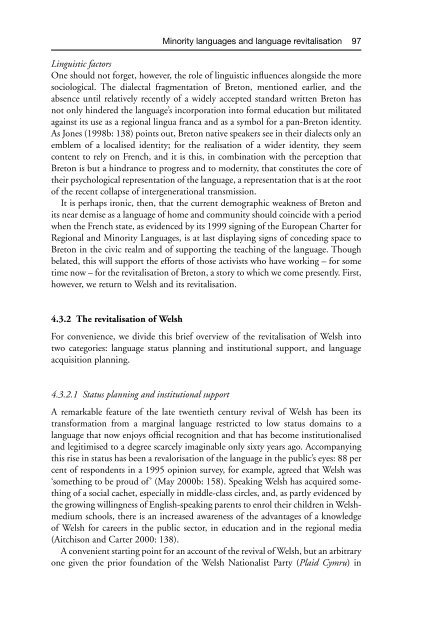Gibson Ferguson Language Planning and Education Edinburgh ...
Gibson Ferguson Language Planning and Education Edinburgh ...
Gibson Ferguson Language Planning and Education Edinburgh ...
You also want an ePaper? Increase the reach of your titles
YUMPU automatically turns print PDFs into web optimized ePapers that Google loves.
Minority languages <strong>and</strong> language revitalisation 97<br />
Linguistic factors<br />
One should not forget, however, the role of linguistic influences alongside the more<br />
sociological. The dialectal fragmentation of Breton, mentioned earlier, <strong>and</strong> the<br />
absence until relatively recently of a widely accepted st<strong>and</strong>ard written Breton has<br />
not only hindered the language’s incorporation into formal education but militated<br />
against its use as a regional lingua franca <strong>and</strong> as a symbol for a pan-Breton identity.<br />
As Jones (1998b: 138) points out, Breton native speakers see in their dialects only an<br />
emblem of a localised identity; for the realisation of a wider identity, they seem<br />
content to rely on French, <strong>and</strong> it is this, in combination with the perception that<br />
Breton is but a hindrance to progress <strong>and</strong> to modernity, that constitutes the core of<br />
their psychological representation of the language, a representation that is at the root<br />
of the recent collapse of intergenerational transmission.<br />
It is perhaps ironic, then, that the current demographic weakness of Breton <strong>and</strong><br />
its near demise as a language of home <strong>and</strong> community should coincide with a period<br />
when the French state, as evidenced by its 1999 signing of the European Charter for<br />
Regional <strong>and</strong> Minority <strong>Language</strong>s, is at last displaying signs of conceding space to<br />
Breton in the civic realm <strong>and</strong> of supporting the teaching of the language. Though<br />
belated, this will support the efforts of those activists who have working – for some<br />
time now – for the revitalisation of Breton, a story to which we come presently. First,<br />
however, we return to Welsh <strong>and</strong> its revitalisation.<br />
4.3.2 The revitalisation of Welsh<br />
For convenience, we divide this brief overview of the revitalisation of Welsh into<br />
two categories: language status planning <strong>and</strong> institutional support, <strong>and</strong> language<br />
acquisition planning.<br />
4.3.2.1 Status planning <strong>and</strong> institutional support<br />
A remarkable feature of the late twentieth century revival of Welsh has been its<br />
transformation from a marginal language restricted to low status domains to a<br />
language that now enjoys official recognition <strong>and</strong> that has become institutionalised<br />
<strong>and</strong> legitimised to a degree scarcely imaginable only sixty years ago. Accompanying<br />
this rise in status has been a revalorisation of the language in the public’s eyes: 88 per<br />
cent of respondents in a 1995 opinion survey, for example, agreed that Welsh was<br />
‘something to be proud of’ (May 2000b: 158). Speaking Welsh has acquired something<br />
of a social cachet, especially in middle-class circles, <strong>and</strong>, as partly evidenced by<br />
the growing willingness of English-speaking parents to enrol their children in Welshmedium<br />
schools, there is an increased awareness of the advantages of a knowledge<br />
of Welsh for careers in the public sector, in education <strong>and</strong> in the regional media<br />
(Aitchison <strong>and</strong> Carter 2000: 138).<br />
A convenient starting point for an account of the revival of Welsh, but an arbitrary<br />
one given the prior foundation of the Welsh Nationalist Party (Plaid Cymru) in






